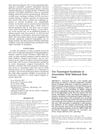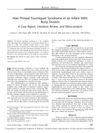 47 citations,
February 2019 in “Journal of The American Academy of Dermatology”
47 citations,
February 2019 in “Journal of The American Academy of Dermatology” LGBT individuals have unique skin health needs, including higher STD risks and side effects from gender-affirming treatments, requiring dermatologists to offer knowledgeable and culturally competent care.
 47 citations,
November 1982 in “Journal of Cardiovascular Pharmacology”
47 citations,
November 1982 in “Journal of Cardiovascular Pharmacology” Nitrendipine and nifedipine effectively block muscle contractions, while papaverine relaxes them and minoxidil needs high amounts to work.
 46 citations,
September 2016 in “Clinical, Cosmetic and Investigational Dermatology”
46 citations,
September 2016 in “Clinical, Cosmetic and Investigational Dermatology” Hormonal treatments are effective for severe or persistent acne and should be used with other acne therapies, considering potential side effects.
 46 citations,
September 2013 in “PLOS ONE”
46 citations,
September 2013 in “PLOS ONE” Thyrotropin-Releasing Hormone helps heal wounds in frog and human skin.
 45 citations,
August 2019 in “Dermatologic Therapy”
45 citations,
August 2019 in “Dermatologic Therapy” Hair loss treatments work better with lifestyle changes.
 45 citations,
March 2015 in “Clinical Endocrinology”
45 citations,
March 2015 in “Clinical Endocrinology” Testosterone therapy is generally safe for transmen, improves sexual function, and has manageable health risks with proper monitoring.
 45 citations,
February 2012
45 citations,
February 2012 Obese women with PCOS are more likely to have fatty liver disease.
 45 citations,
September 2011 in “Journal of the European Academy of Dermatology and Venereology”
45 citations,
September 2011 in “Journal of the European Academy of Dermatology and Venereology” Obese people have more skin problems like stretch marks and infections, which get worse with higher obesity levels.
 45 citations,
March 2003 in “Pediatrics”
45 citations,
March 2003 in “Pediatrics” Baby's toe injury linked to mom's hair loss; check baby's toes and be careful with fruit gel snacks.
 45 citations,
July 2002 in “The Neurologist”
45 citations,
July 2002 in “The Neurologist” A comprehensive approach to educating patients and managing side effects is crucial for improving adherence to multiple sclerosis treatments and patient quality of life.
 45 citations,
November 1979 in “British Journal of Dermatology”
45 citations,
November 1979 in “British Journal of Dermatology” Minoxidil causes excessive hair growth in almost all patients.
 44 citations,
October 2011 in “Gynecological Endocrinology”
44 citations,
October 2011 in “Gynecological Endocrinology” Menopause significantly reduces skin collagen, leading to thinner, less elastic skin, and hormone replacement may help but requires careful consideration.
 43 citations,
November 2019 in “American Journal of Clinical Dermatology”
43 citations,
November 2019 in “American Journal of Clinical Dermatology” FAGA diagnosis uses blood tests and trichoscopy, with treatments like topical minoxidil, oral anti-androgens, and hormone-modulating drugs.
 43 citations,
July 2019 in “Stem Cells International”
43 citations,
July 2019 in “Stem Cells International” Advancements in creating skin grafts with biomaterials and stem cells are promising, but more research is needed for clinical application.
 43 citations,
July 2014 in “Experimental Dermatology”
43 citations,
July 2014 in “Experimental Dermatology” Hair follicles can help wounds heal faster and this knowledge could be used to treat chronic skin ulcers, with a potential use of a special stem cell hydrogel to enhance healing.
 43 citations,
December 2013 in “Stem Cells”
43 citations,
December 2013 in “Stem Cells” Stretching skin increases a certain protein that attracts stem cells, helping skin regeneration.
 43 citations,
September 2012 in “International Journal of Dermatology”
43 citations,
September 2012 in “International Journal of Dermatology” Hormonal therapies are safe and effective for treating adult women's acne.
 43 citations,
September 2006 in “Annals of Plastic Surgery”
43 citations,
September 2006 in “Annals of Plastic Surgery” A hair wrapped tightly around an infant's toe caused severe damage, requiring early removal and possibly surgery to prevent worse outcomes like amputation.
 43 citations,
May 1986 in “Clinics in Endocrinology and Metabolism”
43 citations,
May 1986 in “Clinics in Endocrinology and Metabolism” Cyproterone acetate is effective for treating hirsutism and acne but less so for hair loss, with side effects similar to birth control pills.
 43 citations,
January 1977 in “Toxicology and Applied Pharmacology”
43 citations,
January 1977 in “Toxicology and Applied Pharmacology” Minoxidil is mostly safe, but high doses can cause electrolyte imbalances and heart issues in dogs.
 42 citations,
November 2019 in “Frontiers in Endocrinology”
42 citations,
November 2019 in “Frontiers in Endocrinology” The document suggests creating a validated score to diagnose Cushing's Syndrome and considers plasma steroid profiling as a simpler diagnostic method.
 42 citations,
July 2015 in “Journal of The American Academy of Dermatology”
42 citations,
July 2015 in “Journal of The American Academy of Dermatology” The conclusion is that oral contraceptives and antiandrogens can treat hirsutism and acne in women with cutaneous hyperandrogenism, but more research is needed for effective treatments, especially for hair loss.
 42 citations,
February 1985 in “Journal of the American Academy of Dermatology”
42 citations,
February 1985 in “Journal of the American Academy of Dermatology” Excessive hair growth can be assessed by history, exam, and blood tests, and treated with medication like dexamethasone, birth control pills, and spironolactone.
 41 citations,
September 2018 in “Australasian journal of dermatology”
41 citations,
September 2018 in “Australasian journal of dermatology” No systemic treatment for alopecia areata has strong evidence of effectiveness.
 41 citations,
October 2017 in “International Journal of Women's Dermatology”
41 citations,
October 2017 in “International Journal of Women's Dermatology” Most pregnant women experience skin darkening and hair changes, with these effects usually going away after giving birth.
 41 citations,
November 2003 in “Annals of the New York Academy of Sciences”
41 citations,
November 2003 in “Annals of the New York Academy of Sciences” Male hormones, or androgens, affect women's health in areas like mood and bone density, and hormone replacement therapy using antiandrogenic progestogens can improve mood disorders and alertness in menopausal women.
 40 citations,
August 2014 in “Journal of Nanoparticle Research”
40 citations,
August 2014 in “Journal of Nanoparticle Research” Silver nanoparticles in gel form can effectively heal wounds.
 40 citations,
December 1980 in “The Journal of Dermatologic Surgery and Oncology”
40 citations,
December 1980 in “The Journal of Dermatologic Surgery and Oncology” An improved scalp reduction technique reduces the need for hair grafts and has minimal complications.
 39 citations,
July 2021 in “Stem Cell Research & Therapy”
39 citations,
July 2021 in “Stem Cell Research & Therapy” Using fat stem cells and blood cell-rich plasma together improves healing in diabetic wounds by affecting cell signaling.
 39 citations,
May 2011 in “European Journal of Clinical Investigation”
39 citations,
May 2011 in “European Journal of Clinical Investigation” Hirsutism can be caused by various conditions besides PCOS, and it's important to treat the underlying issue and manage symptoms with medication and cosmetic approaches.





























